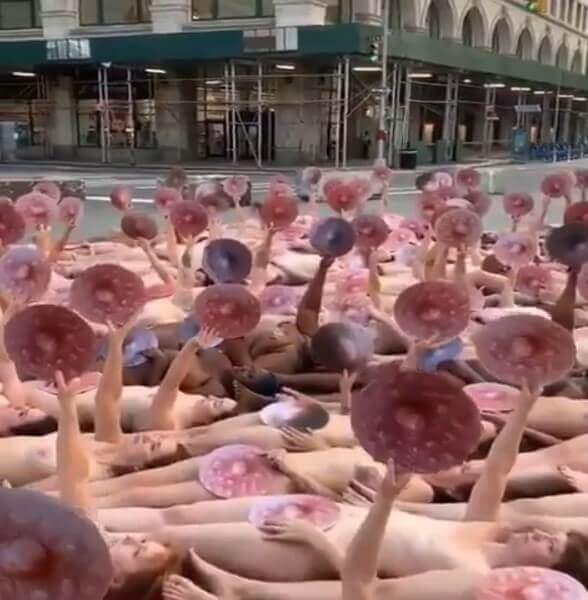Protesters Bare All Outside Facebook Headquarters to Fight Censorship
Challenging the double-standard of policing women’s bodies online.

More than 100 nude protesters gathered outside Facebook’s New York headquarters this month to demonstrate against the tech giant’s nudity policies.
In coalition with the National Coalition Against Censorship (NCAC), artist Spencer Tunick organized the #WeTheNipple campaign to highlight how gender inequality affects how media is regulated on Facebook as well as on its photo-sharing platform Instagram.
Specifically, the group bared all on Sunday, June 2, to draw attention to the double standards applied to censoring women’s nipples, but not men’s.
#freethenipple, #freedomofexpression
Tunick, who is well-known for live, nude human installations, instructed the protesters to lie naked on the concrete and use oversized, cut-out photographs of male nipples covering their genitals.
The nipple photographs in question were created from celebrity donations, such as Andy Cohen, Andres Serrano, and Chad Smith, as well as Tunick’s own.
Instagram and Facebook do not allow nudity on their platforms. This includes sexual acts, genitals, and buttocks. It also covers digitally created or realistic art content.
View this post on Instagram
Invisible bodies and ignored sexualities
Tunick and the NCAC argue that these policies particularly affect people of color, women, people who are non-binary or gender non-conforming, as well as those belonging to the LGBTQIA community.
The nudity ban also targets sex workers who use social media sites to promote their work, including pornography, full-service, and webcam shows. These sites have become particularly important following the loss of Backpage after FOSTA/SESTA (Fight Online Sex Trafficking Act/ Stop Enabling Sex Traffickers Act.
Instagram is also experimenting with demoting content that it deems less appropriate for the site, which does not directly violate their current content policies.
This includes non-nude but sexually suggestive, violent, or shocking content. It would not be shown in the News Feed but would still be available for followers and Instagram Stories.
The future of sex cannot be determined by algorithms. Instagram’s policing of sexuality through a rigid set of policies can be detrimental to the visibility of bodies that do not conform to traditional beauty and relationship norms, with the demoting or removal of the content rendering them invisible on social media.
Tunick’s protest sends a clear message to Instagram and Facebook that it’s time to modernize their approach to sexual expression. It’s time to allow for equal access for all bodies, sexualities, and ethnicities.
Image source: arakofficial/Instagram
Leave a reply
You must be logged in to post a comment.

















